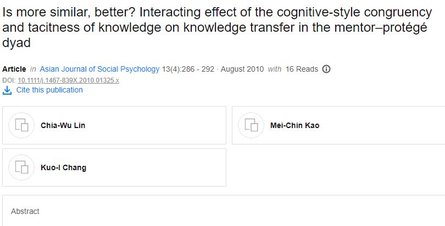
This study explored the effects of cognitive-style congruency on knowledge transfer in the mentor–protégé dyadic relationship and the moderating effect of tacitness of knowledge in this relationship. Using data from 148 sales personnel dyads, we found that the more congruent the cognitive style between a mentor and a protégé, the more effective the knowledge transfer between them. Moreover, the tacitness of knowledge moderated this association as expected. When the knowledge to be transferred was organized, systematic, and clear, this positive relationship was weakened. This relationship was particularly strong when the knowledge to be transferred was tacit, ambiguous, and unclear.
